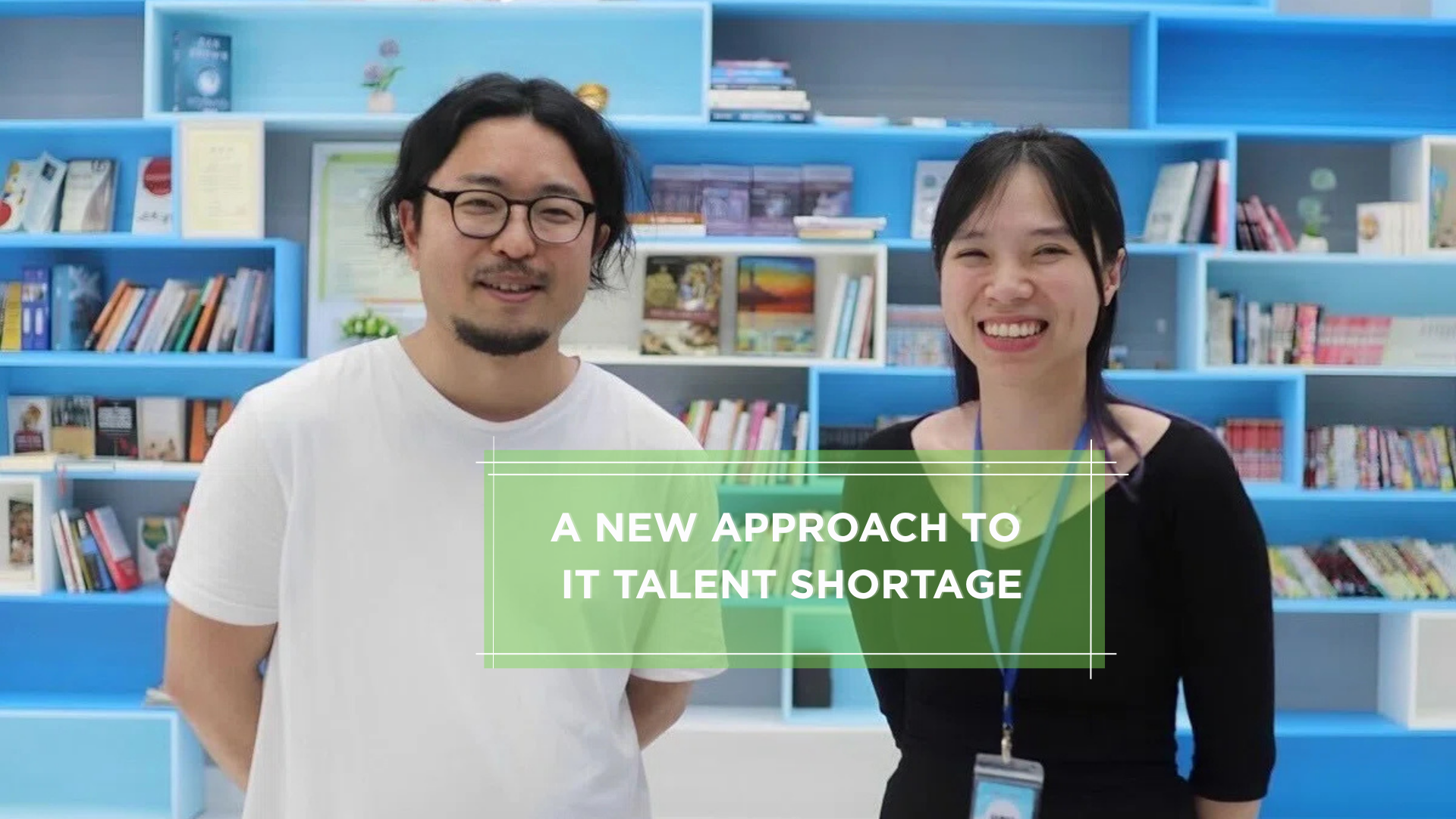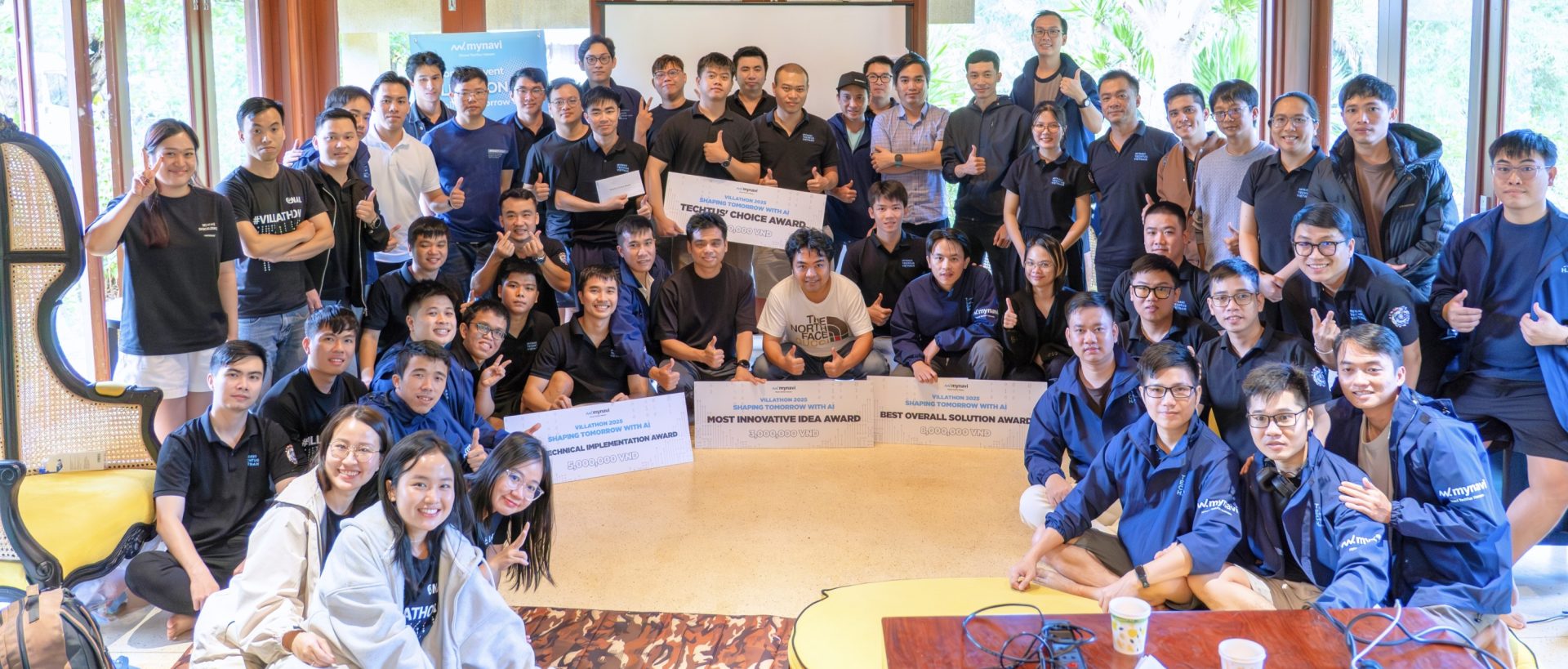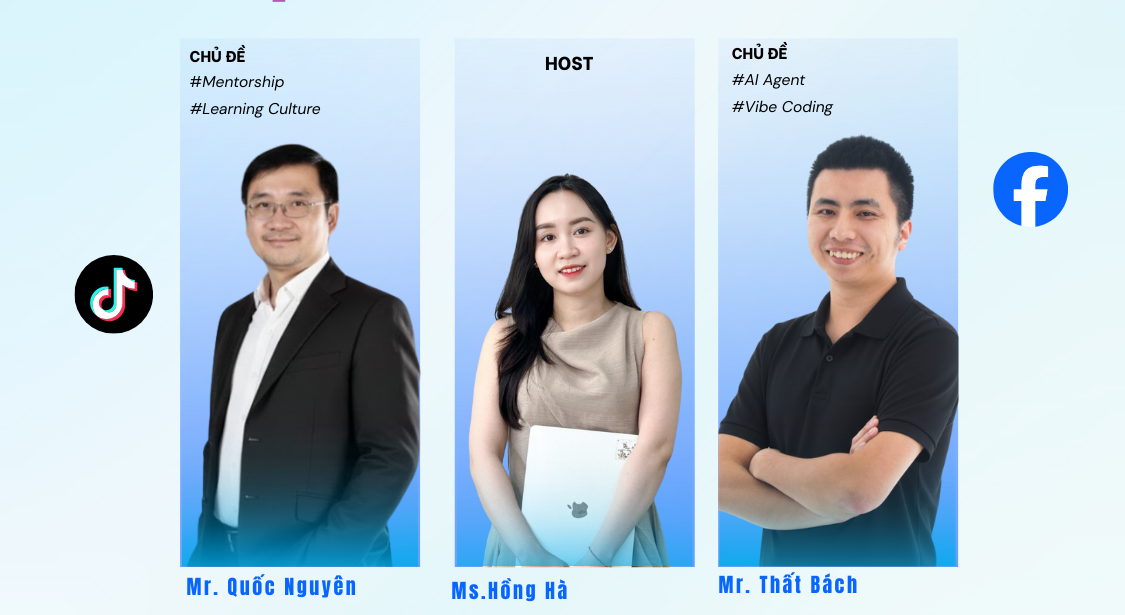Offshore development is the practice of having an overseas company build software systems and business applications. To achieve this, Mynavi partnered with NAL Solutions Joint Stock Company in 2022. In 2025, NAL Solutions officially became a Mynavi Group subsidiary, and was renamed Mynavi TechTus Vietnam (abbreviated as TechTus). With TechTus as a development partner, Mynavi has successfully supported many Japanese clients with their offshore projects.
But why did Mynavi enter this field, and why was TechTus chosen as the partner? We explored the answers in a conversation with Mr. Kubo Mitsunori from Mynavi Corporation’s DX Design Division and Ms. Nguyen Thu Hong, an Associate Product Owner at TechTus. They shared their perspectives on the strengths of this partnership and the value it has created.
Meet the Guests
Kubo Mitsunori (久保充範) – Project Management Manager, DX Design Division, Mynavi Corporation
Mr. Kubo studied abroad in France before starting his professional career. After graduation, he helped establish the Japanese Embassy in Djibouti before spending time in Canada on a Working Holiday program. He then took on a role as a Business Analyst at an offshore company in Vietnam. In December 2022, he joined Mynavi, becoming part of the team that would later form the DX Design Division.
Nguyen Thu Hong – Associate Product Owner (APO), Mynavi TechTus Vietnam
Ms. Thu Hong is a graduate of Nagoya University in Japan. She previously worked as an interpreter and communications specialist in automotive navigation system testing for a Japanese company. In October 2022, she joined TechTus as an APO, where she is responsible for bridging communication between clients and the development team.
Addressing Japan’s IT Talent Shortage with Overseas Engineers
Interviewer: First, could you tell us about the background and goals behind the creation of the DX Design Division?
Mr. Kubo: Japan has recently faced a severe talent shortage, especially in the technology and digital transformation (DX) sectors. The demand for engineers in areas like generative AI and SaaS development is skyrocketing, leading to fierce competition for skilled professionals. This has been a major concern, as we’ve struggled to fully meet our clients’ needs.
Our solution was to expand into offshore development. Instead of focusing solely on providing engineers within Japan, we aimed to leverage overseas talent to address our clients’ system development and workforce needs. That was the purpose behind establishing the DX Design Division, which was built on our collaboration with NAL Solutions, now TechTus.
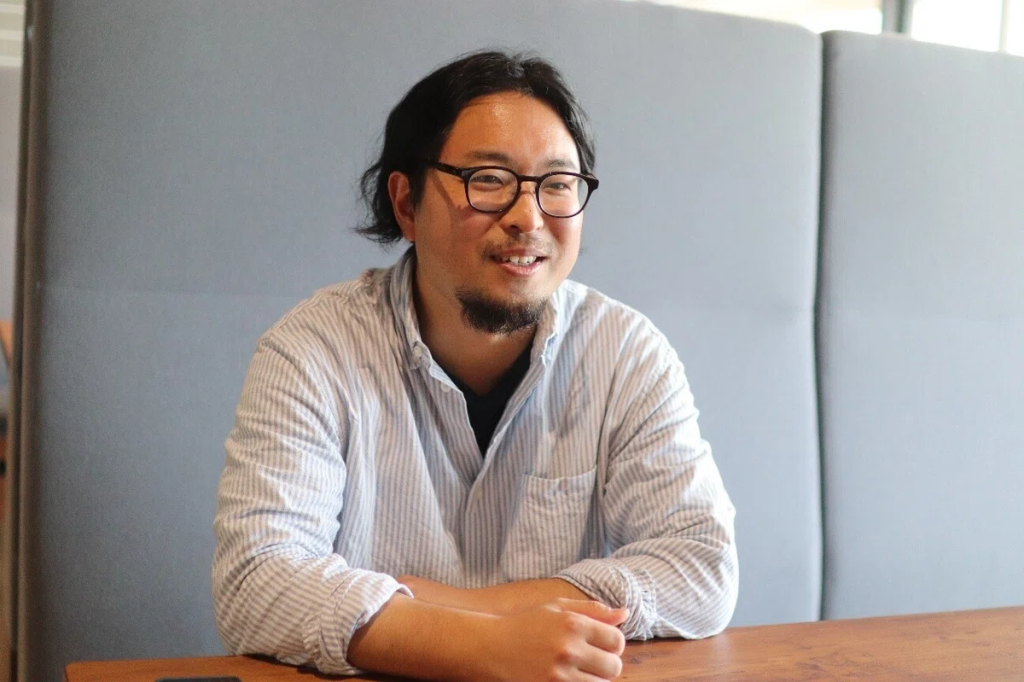
Ms. Thu Hong: We are a team of experienced engineers with a strong focus on remote software development. With nearly 200 outstanding engineers, TechTus has been recognized by the Vietnam Software and IT Services Association (VINASA), first as a “Top 50+10 Leading IT Company in Vietnam” and now as one of the “Top 10 Leading IT Companies in Vietnam.” What’s more, many of our leaders and team members are graduates of Japanese universities, which allows us to adapt easily to Japanese culture. This is one of the main reasons many Japanese companies choose TechTus as their offshore development partner. This aligns with the vision outlined in IT人材不足を解決する新たな一手。マイナビとベトナム企業Mynavi TechTus Vietnamが描く未来とは。
Mr. Kubo: The DX Design Division manages system development projects for Japanese clients, collaborating closely with TechTus to deliver results. To guarantee top-quality results, including on the technical side, we also act as the liaison between our clients and the TechTus development team.
“Simply Knowing Japanese Isn’t Enough to Communicate Requirements Properly”
Interviewer: Could you tell us more about your background, skills, and those of the members in the DX Design Division?
Ms. Hong: In high school, I was a fan of a Japanese idol group, and that’s when I first became interested in Japanese culture. After graduating from university in Japan, I worked as an interpreter and communications specialist on automotive navigation system testing projects for a Japanese company.
This role made me realize that simply knowing Japanese isn’t enough to properly communicate requirements or ensure a smooth workflow between clients and the team. Effective communication requires both language ability and technical knowledge. When I transferred to the Hanoi branch in Vietnam, I continued in a similar role, further strengthening my knowledge of language and software testing.
The COVID-19 pandemic and motherhood sparked my interest in remote work, which led me to join TechTus. Now, I work mostly remotely as an Associate Product Owner, coordinating between clients, the Mynavi team, and our engineers.
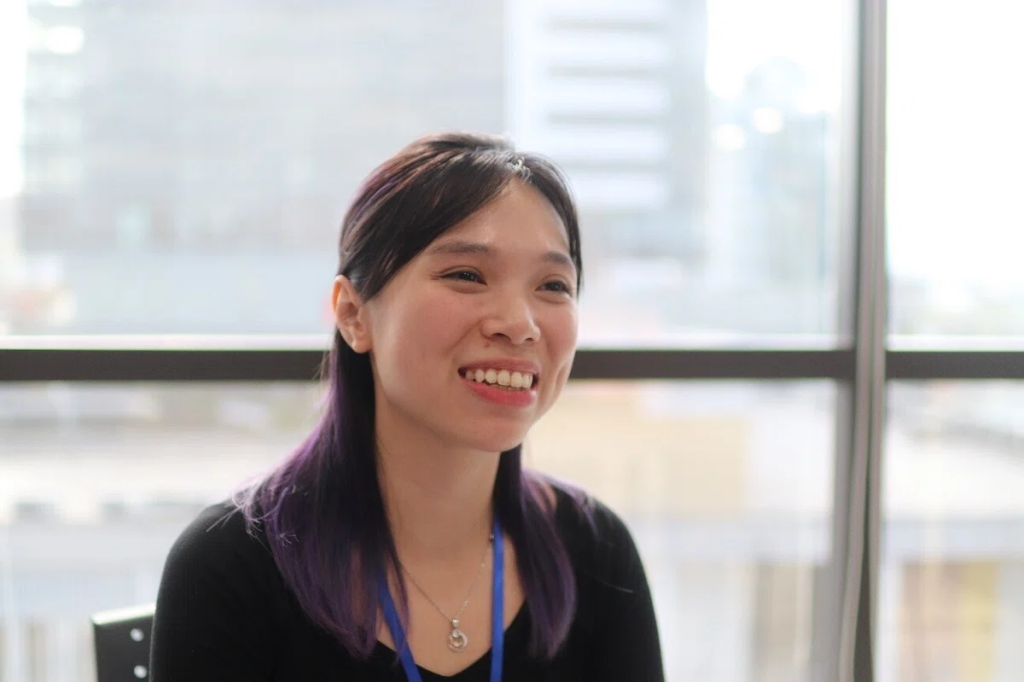
Mr. Kubo: After my working holiday in Canada, I realized that to stay competitive, I needed more than just language skills—I also needed technical expertise. That inspired me to pursue software development. I chose to become a Business Analyst, a career open even to non-engineers, and joined an offshore company in Vietnam. Like Hong, I worked as a bridge between clients and the development team.
Our DX Design Division brings together people from diverse backgrounds. Some are experienced in application and software development, while others have worked as system engineers or project managers. We also have members who started with no prior experience.
For example, one colleague was a web marketer. After transferring to our division, he taught himself development processes and models. Now, he’s one of the few among our 12 members who can clearly synthesize and organize requirements before a project begins. This spirit of self-learning is one of Mynavi’s greatest strengths.
TechTus’s Strengths: Strong Communication and Speed
Interviewer: What are your impressions of Ms. Hong and the TechTus team?
Mr. Kubo: What impressed me most is the language ability and communication skills of the TechTus members. At my previous company, people in roles like Associate Product Owner were rarely allowed to communicate directly with Japanese clients. Hong not only does this, but she also shows a strong sense of responsibility and is always committed to the project’s success. She is truly a reliable partner. Thanks to this direct communication, we’ve been able to minimize delays and misunderstandings, allowing projects to progress faster. Our clients really appreciate that.
The TechTus development team is also committed to continuous improvement. They quickly and efficiently apply the PDCA (Plan-Do-Check-Act) cycle to boost both quality and efficiency. Whenever we propose an improvement, they immediately discuss it and put it into action. Their pace feels much faster than typical Japanese companies. Their abundant energy and open work environment are what make TechTus so attractive and give them a competitive edge.
Interviewer: In your role as a bridge between clients and TechTus, what do you consider most important?
Mr. Kubo: There are significant differences between Japan and Vietnam in terms of culture, business practices, and language. Supporting smooth communication to avoid misunderstandings is therefore essential. In system development, even Japanese teams need close collaboration across many processes such as requirements definition and budget management. That’s why we strive to make these processes as clear and visual as possible through diagrams and documentation, ensuring the client, Mynavi, and TechTus are always on the same page.
Ms. Hong: Differences in communication styles between the two countries can lead to risks, especially during critical phases like schedule adjustments, requirement changes, or additional costs. The support from Mr. Kubo and the DX Design members has helped us reach a consensus smoothly. In addition, Mr. Kubo often visits the TechTus office in Vietnam, and recently I had the chance to visit Mynavi’s office in Tokyo. These face-to-face opportunities are extremely valuable, as they allow us to communicate and collaborate more openly.
Becoming an Indispensable Partner
Interviewer: Finally, could you share your vision for the future of the project?
Mr. Kubo: We are very fortunate to have earned our clients’ trust and been entrusted with a variety of system development projects. This has allowed both Mynavi and TechTus to accumulate deep knowledge, development skills, and consulting expertise. At the same time, our project framework has become increasingly refined. I believe we have successfully completed the initial foundation-building phase, and now it’s time to scale up and expand.
In the future, besides fine-tuning our development processes to improve efficiency, we also want to leverage the knowledge we’ve gained to develop our own products and promote DX within Mynavi. Ultimately, we aim to develop Mynavi’s full range of services independently and bring even greater value to our clients, becoming a trusted partner for both Mynavi and those we serve.
Ms. Hong: I fully agree with Mr. Kubo’s vision. To make it a reality, I will continue to strive to deepen my understanding of both the client side and the engineering team, guiding projects to success and creating high-quality products that satisfy clients.
Mr. Kubo: The TechTus team is truly reliable and deeply inspiring. I hope that together we can continue combining our knowledge and skills to grow even further.
The synergy between Mynavi and Mynavi TechTus Vietnam has become a groundbreaking and effective solution for the IT talent shortage in Japan. By leveraging the technical capabilities of our Vietnamese team and Mynavi’s project management and client-understanding skills, we have not only filled a gap but also built a sustainable development model. This relationship is the solid foundation for both companies to grow together, deliver tangible value to clients, and assert our position in the technology market.
Explore more: Not What You Think: 5 Common Misconceptions About Japanese Clients in the IT Industry

